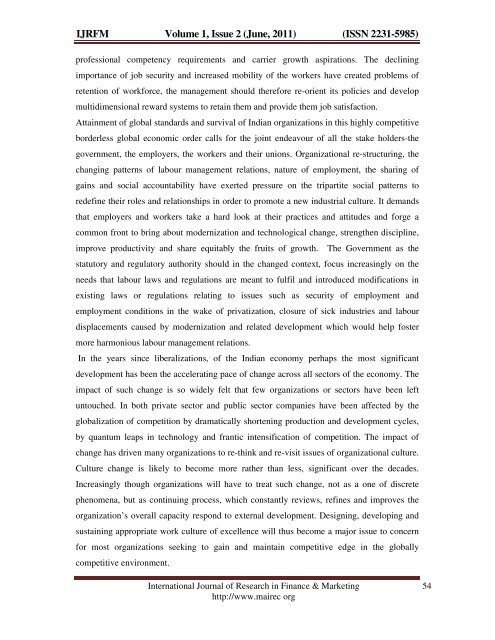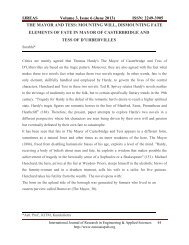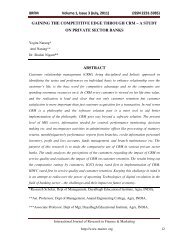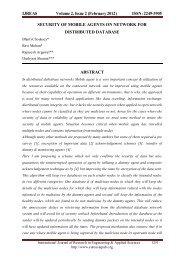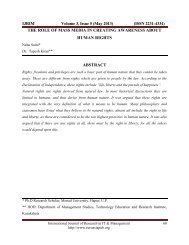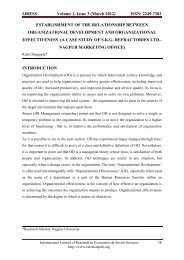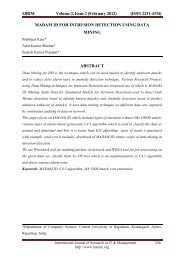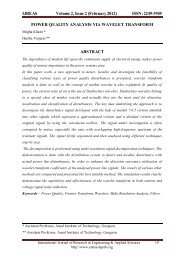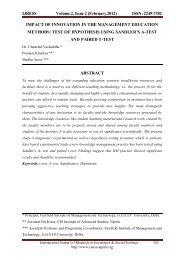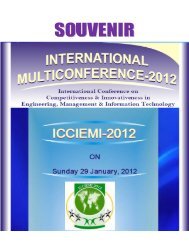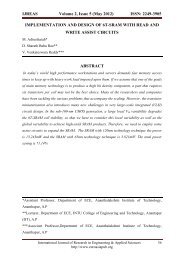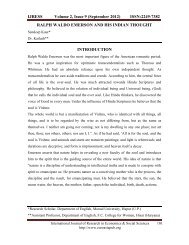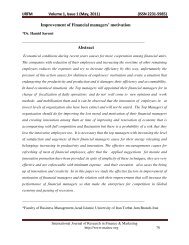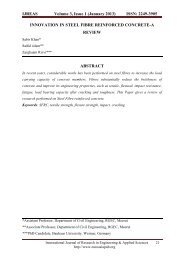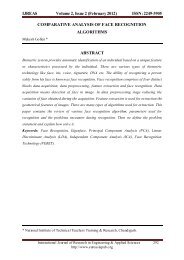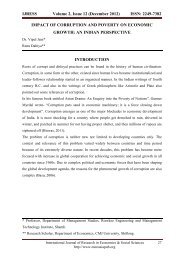A RELATIONSHIP BETWEEN ORGANISATIONAL ... - Euroasiapub.org
A RELATIONSHIP BETWEEN ORGANISATIONAL ... - Euroasiapub.org
A RELATIONSHIP BETWEEN ORGANISATIONAL ... - Euroasiapub.org
You also want an ePaper? Increase the reach of your titles
YUMPU automatically turns print PDFs into web optimized ePapers that Google loves.
IJRFM Volume 1, Issue 2 (June, 2011) (ISSN 2231-5985)<br />
professional competency requirements and carrier growth aspirations. The declining<br />
importance of job security and increased mobility of the workers have created problems of<br />
retention of workforce, the management should therefore re-orient its policies and develop<br />
multidimensional reward systems to retain them and provide them job satisfaction.<br />
Attainment of global standards and survival of Indian <strong>org</strong>anizations in this highly competitive<br />
borderless global economic order calls for the joint endeavour of all the stake holders-the<br />
government, the employers, the workers and their unions. Organizational re-structuring, the<br />
changing patterns of labour management relations, nature of employment, the sharing of<br />
gains and social accountability have exerted pressure on the tripartite social patterns to<br />
redefine their roles and relationships in order to promote a new industrial culture. It demands<br />
that employers and workers take a hard look at their practices and attitudes and f<strong>org</strong>e a<br />
common front to bring about modernization and technological change, strengthen discipline,<br />
improve productivity and share equitably the fruits of growth. The Government as the<br />
statutory and regulatory authority should in the changed context, focus increasingly on the<br />
needs that labour laws and regulations are meant to fulfil and introduced modifications in<br />
existing laws or regulations relating to issues such as security of employment and<br />
employment conditions in the wake of privatization, closure of sick industries and labour<br />
displacements caused by modernization and related development which would help foster<br />
more harmonious labour management relations.<br />
In the years since liberalizations, of the Indian economy perhaps the most significant<br />
development has been the accelerating pace of change across all sectors of the economy. The<br />
impact of such change is so widely felt that few <strong>org</strong>anizations or sectors have been left<br />
untouched. In both private sector and public sector companies have been affected by the<br />
globalization of competition by dramatically shortening production and development cycles,<br />
by quantum leaps in technology and frantic intensification of competition. The impact of<br />
change has driven many <strong>org</strong>anizations to re-think and re-visit issues of <strong>org</strong>anizational culture.<br />
Culture change is likely to become more rather than less, significant over the decades.<br />
Increasingly though <strong>org</strong>anizations will have to treat such change, not as a one of discrete<br />
phenomena, but as continuing process, which constantly reviews, refines and improves the<br />
<strong>org</strong>anization’s overall capacity respond to external development. Designing, developing and<br />
sustaining appropriate work culture of excellence will thus become a major issue to concern<br />
for most <strong>org</strong>anizations seeking to gain and maintain competitive edge in the globally<br />
competitive environment.<br />
International Journal of Research in Finance & Marketing 54<br />
http://www.mairec <strong>org</strong>


